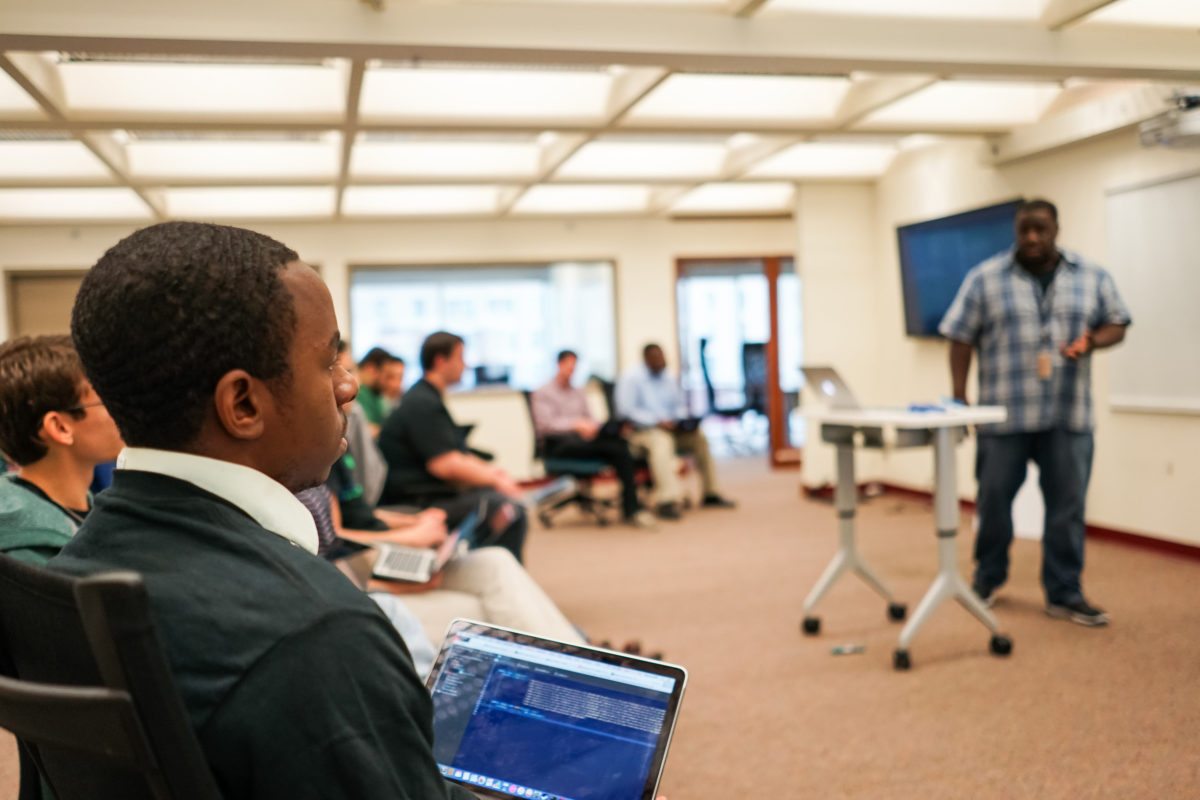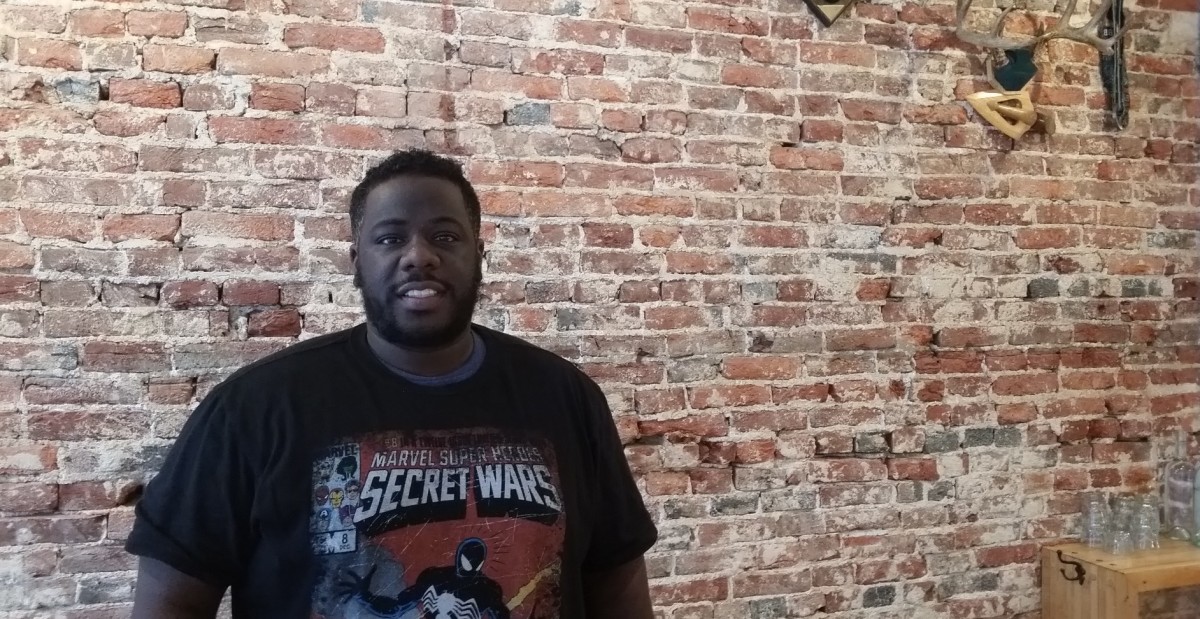When Tariq Hook started out as a young Padawan, he learned how to code in 90 days — just like he now teaches his students.
If you’ve been to a tech meetup in the First State, chances are you’ve met him. As director of education and technology at Zip Code Wilmington, he’s a familiar face in the local tech scene. We checked in with him last year, before his latest bootcamp kicked off. But what you might not have known about him, is how similar his journey is to that of his students. Tariq has done a lot throughout his career but he has always been into coding.
It's amazing to watch someone go from being a student to being your peer and colleague.
Here’s an edited transcript of our recent conversation.
###
How’d you get into coding? Were you always into coding?
Yes and no, my mother was a science teacher in Philadelphia who was always doing STEM before the term STEM was even a thing. When other kids on the block had a Nintendo or a Sega, my mom preferred to invest in an Apple 2E or a Commodore 64. My mom was always into building things, she was really into Lego projects. That turned into robotics when I was in middle school and high school, I got really into robotics.
What was the first robot you worked on?
The first robots I built had nothing to do with computers. They were all about hydraulics, I would do things with fluid and rule dynamics to make claws, cranes and robotic arms. When I was a senior at George Washington Carver High School of Engineering and Science, I did an internship at the University at Pennsylvania’s computer science department. I built a robot that would play tic-tac-toe. There was a physical tic-tac-toe board. I named that robot Ben Franklin. All my robots were named Carverbot, Ben Franklin or George Washington Carver.
When did you write your first line of code?
In eighth grade. HyperCard was the pre-PowerPoint, back in the ’90s. There was a program called Logo where you could move the turtle around. In high school they taught us Pascal.
Then Java, it was popular back in 1996. When I took my first Java class I didn’t know I was taking a programming class in college. There was a cute girl I was talking to when we were registering for classes, I wanted to talk to her. I saw that she was signing up for Java. I thought it was a coffee-making class, so I signed up for it. I did well in the class.
How did you get into languages like C++?
I went on to intern for Front Porch Digital’s chief technology officer, Dean Harris. During those first 90 days I learned how to do software development. It was like a bootcamp. What we do in Zip Code is a lot like what I experienced back then. I went to live with him for a few weeks and all I did was code. After three months he gave me a full-time job. Now he refers to me as his “digital son.”
Why’d you leave Front Porch Digital?
I got into more multimedia after that, I was really into video and MPEG so I went back to school for interactive design and media at the Art Institute of Philadelphia. I already did that stuff at University of Pittsburgh [as an undergraduate], so I flew through a year and a half of curriculum. Then I worked for this little company called BowString Studios [previously Aurora Imaging] out in Conshohocken. While I was there, I was a producer for a reality show on high school football called the Ride, it was on MTV2.

Tariq Hook (right) teaching a course at Zip Code Wilmington. (Courtesy photo)
Reality show? That sounds pretty cool. Was that your passion?
My real passion, I found out, wasn’t really in video and production, it was in software development. So I left and went to work for Kazaam. I worked on websites and mobile apps for pharma companies. Their biggest clients were Johnson & Johnson and AstraZeneca. It was cool, it was a fun job. It was weird because most of those apps that we built around those products. I worked on an app for e.p.t. Pregnancy Test, for example. At some point in time, I could calculate someone’s ovulation calendar in my head. It was really creepy. Some things I wish I could delete from my brain.
What’s the most important lesson you’ve learned in life?
When I left college, I went to Intelligent Business Systems to do network engineering. I did it for two years and hated every minute of it. Darryl Boozer, owner and founder, was a friend of my father. He took me under his wing, I learned a lot of life lessons the two years I worked for him. He was like a kung fu master, he would never tell me a lesson right out, he would want me to figure it out.
How did you get into teaching?
When I was working for Kazaam, I met back up with Dean Harris. I noticed when I went to [dev] conferences I would be one of four black people there, so I decided I wanted to work with kids and mentor them the way I was when I was growing up. So Harris set me up with a part-time job teaching on a grant at Temple University focused on bringing minority high-school students into engineering and mobile development.
The way I teach at Zip Code is the way Dean taught me how to do software, unrelenting and unforgiving.
What do you like about your job at Zip Code Wilmington right now?
I enjoy helping people finding what they love about coding. Professionally, I love being able to have open access, I can sit down and talk to engineers at Capital One or Barclays. It’s a teaching experience but it’s also a learning experience for me. People that I taught are having a profound impact on the companies they’re working for like building frameworks that work inside of companies, there building software that people use everyday for transactions, building applications that help people watch TV. They all bring that back to Zip Code. It’s amazing to watch someone go from being a student to being your peer and colleague. They go from 0 to 100, it’s amazing.
Is there anything you’d change about your job right now?
When you get someone that doesn’t know anything and three months later, they develop and they get cool and you wanna hangout with them. But then they leave for work. Then you start over, it’s like Groundhog Day.
One thing I’d do different is I’d like to be able to work with them as they advance in different stages.
Do you still write code?
The only time I get to write software right now is between classes. The month and a half we have in-between classes, if I’m not working on recruitment, I’m in the corner working on software for myself but if someone comes in and asks me for help, I’m never going to say no. It’s my job to look at your code. It’s my No.1 responsibility.
These students quit their jobs, they left their lives to depend on someone to teach them code and help them. That’s what I’m there for.
Anything else?
I wanna do a special shoutout to Melanie Augustin, I couldn’t do my job without her.
Join the conversation!
Find news, events, jobs and people who share your interests on Technical.ly's open community Slack

Delaware daily roundup: Early-stage loan help; Jobless rate drops below 4%; $700k grant for industrial park

Delaware daily roundup: Greentech terms to know post-Earth Day; generative AI's energy costs; anti-AI deepfake legislation

Will generative AI replace software developers?

